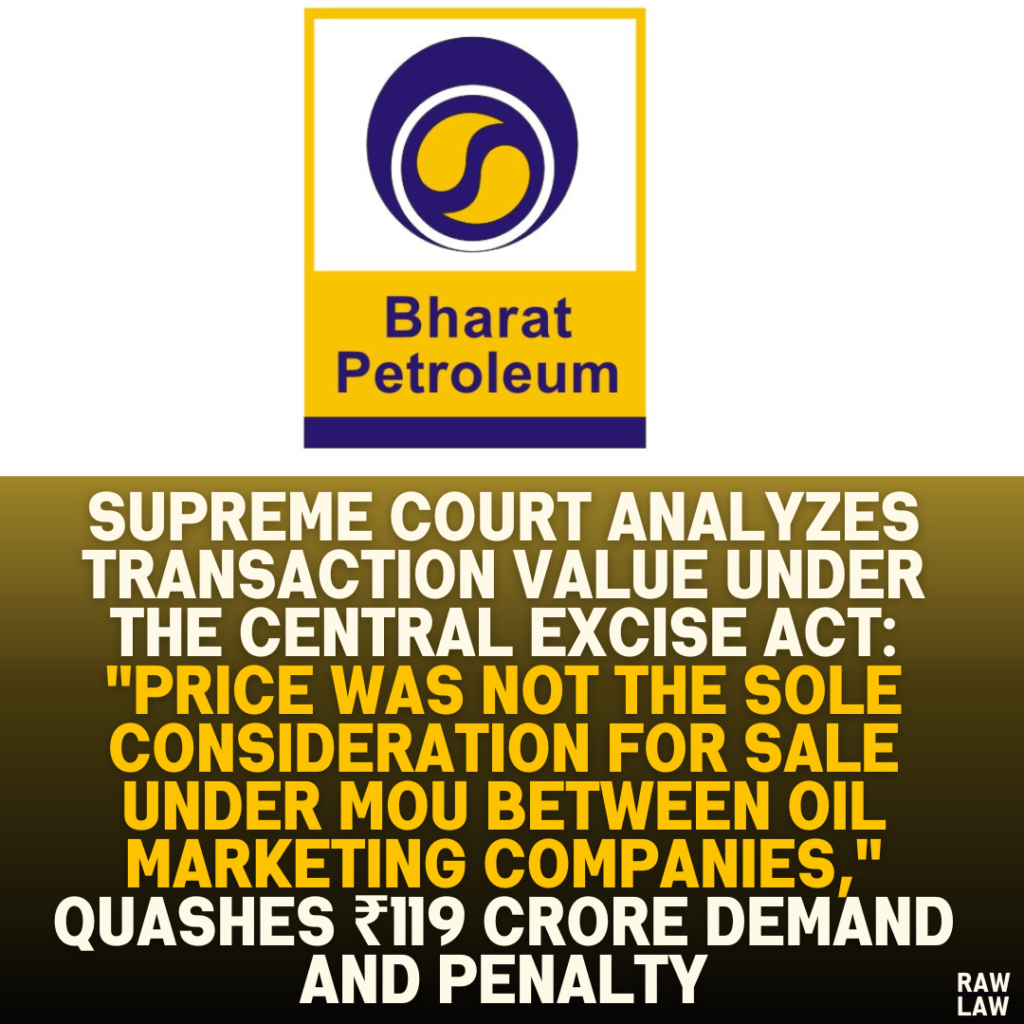Court’s Decision:
The court made the following key rulings:
- BPCL’s Appeal Allowed: In Civil Appeal No. 5642 of 2009, the court set aside the excise duty demand and penalty imposed on BPCL.
- Other Appeals Remanded: The appeals involving other OMCs (IOCL, HPCL, etc.) were remanded to the Tribunal for fresh adjudication, ensuring consistency with the findings of the Supreme Court.
- Key Holdings:
- The price fixed under the MOU was not the sole consideration for sales.
- The extended period of limitation under Section 11A of the 1944 Act was not validly invoked.
- Penalty under Section 11AC could not be sustained due to the absence of fraud or willful misrepresentation.
Facts:
- Parties and Background:
- BPCL and other OMCs entered into an MOU to facilitate the smooth supply of petroleum products across India.
- Pricing under the MOU was based on Import Parity Price (IPP), which included the landed cost, transportation, and terminal charges.
- Dual Pricing Allegations:
- The Central Excise Department alleged that OMCs sold products to each other at a lower price (IPP) and to their dealers at a higher price.
- It argued that excise duty should have been calculated based on the higher dealer price, not the IPP.
- Demands and Penalties:
- Show-cause notices were issued between 2002 and 2005 for alleged under-assessment of duty.
- The extended limitation period was invoked, and penalties were imposed under Section 11AC.
Issues:
The court identified three primary issues:
- Was the price under the MOU the sole consideration for sales?
- Could the extended period of limitation under Section 11A(1) be invoked?
- Was the penalty under Section 11AC validly imposed?
Petitioner’s Arguments:
- Transaction Value:
- BPCL argued that under Section 4, the transaction value is the actual price paid or payable, and it lawfully adopted different prices for sales to OMCs and dealers.
- The MOU pricing was based on IPP and reflected the sole consideration for the sales.
- Validity of Limitation Period:
- BPCL contended that the extended limitation period could not apply because the MOU was known to the Revenue.
- There was no fraud or suppression of facts.
- Penalty:
- BPCL asserted that no fraudulent intent or collusion existed, making the penalty under Section 11AC unwarranted.
Respondent’s Arguments:
- Multiple Pricing:
- The Revenue argued that the MOU involved broader mutual benefits, indicating that price was not the sole consideration for sales.
- It alleged that BPCL suppressed the MOU, justifying the invocation of the extended limitation period.
- Penalty Justification:
- The Revenue contended that suppression of material facts warranted penalties under Section 11AC.
Analysis of the Law:
- Section 4 of the Central Excise Act:
- For a price to qualify as the transaction value under Section 4(1)(a), it must be the sole consideration for the sale. The court observed that the MOU’s terms were not purely commercial and included broader objectives like ensuring a consistent supply chain.
- Section 11A (Extended Limitation Period):
- The extended limitation period applies only if there is fraud, collusion, or willful suppression of facts. The court found no evidence of such misconduct by BPCL, noting that the MOU was a publicly known document.
- Section 11AC (Penalty):
- Penalties require proof of intent to evade duty. In this case, the absence of fraud or suppression invalidated the penalty imposed under Section 11AC.
Precedent Analysis:
- Hindustan Petroleum Corporation Ltd. v. Commissioner of Central Excise (2005):
- The Tribunal had relied on this decision to support its findings. However, the Supreme Court noted that the Tribunal did not adequately analyze whether the price was the sole consideration under the MOU.
- The court clarified that summary dismissal of an appeal does not amount to a binding precedent on all issues.
- Kunhayammed v. State of Kerala (2000):
- The principle of merger was discussed, emphasizing that only issues explicitly decided in earlier judgments can bind future cases.
Court’s Reasoning:
- MOU’s Nature:
- The court found that the MOU primarily aimed to ensure uninterrupted supply and efficient distribution of petroleum products rather than purely commercial sales.
- The broader mutual benefits under the MOU indicated that price was not the sole consideration.
- Limitation Period:
- The Revenue’s claim of suppression of facts was baseless, as the MOU was publicly known and referred to in government circulars.
- Penalty:
- No fraudulent intent or suppression was proven, rendering the penalty under Section 11AC unsustainable.
Conclusion:
- The appeal by BPCL was allowed, and the demand for excise duty, including penalties, was quashed.
- The court remanded other appeals to the Tribunal for fresh adjudication, ensuring alignment with the principles laid down in this judgment.
Implications:
- Clarification on Transaction Value:
- The judgment reinforces that excise duty valuation must strictly adhere to the statutory definition of transaction value under Section 4.
- Extended Limitation and Penalty:
- The ruling limits the scope of invoking the extended limitation period and imposing penalties, emphasizing the need for clear evidence of fraud or suppression.
- Impact on PSUs:
- The decision highlights the importance of distinguishing commercial sales from mutual arrangements in public-sector undertakings.
